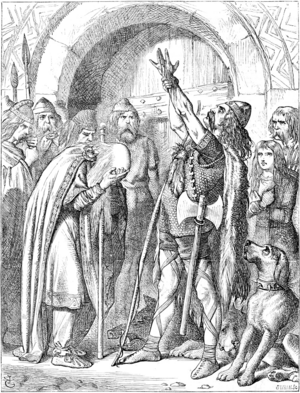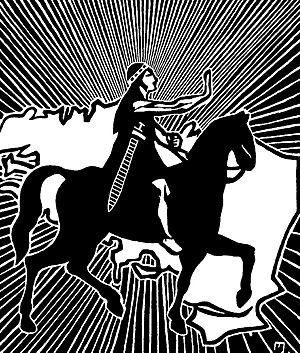Nominoe facts for kids
Quick facts for kids Nominoe |
|
|---|---|

Nominoe's Vow, a Victorian illustration to a ballad about Nominoe in Barzaz Breiz in which he vows vengeance on the Franks for killing a Breton emissary
|
|
| Duke of Brittany | |
| Reign | 841–851 |
| Predecessor | Wihomarc |
| Successor | Erispoe |
| Born | c. 800 |
| Died | 7 March 851 (aged ~50–51) |
| Burial | Redon Abbey, Ille-et-Vilaine 47°39′00″N 2°05′02″W / 47.650°N 2.084°W |
| Issue | Erispoe |
Nominoe (born around 800, died March 7, 851) was a very important leader in Brittany, a region in what is now France. He is known as the first Duke of Brittany, ruling from 846 until his death. Many people in Brittany see him as the "father of the country" (Tad ar Vro in Breton), a bit like a founding father.
Contents
Who was Nominoe?
Nominoe was the second son of Count Erispoë I of Poher. His family was well-known in the region of Poher.
Becoming a Leader: Nominoe and Louis the Pious
After a big rebellion in the Carolingian Empire (a large empire in Europe at the time), Emperor Louis the Pious chose Nominoe to lead the people of Brittany. This happened around 831.
Nominoe was a strong supporter of Emperor Louis the Pious. He helped Louis during several civil wars in the 830s. He also supported Redon Abbey, a monastery, even asking the monks to pray for the emperor.
Nominoe's main power base was in the area of Vannes. Sometimes he was called the Count of Vannes. The emperor called him a "faithful one" or an "imperial emissary," which meant he was a trusted representative of the emperor.
Over time, Nominoe was known by different titles in Brittany, showing his growing power:
- "Nominoe, master in Brittany"
- "Nominoe, possessing Brittany"
- "Nominoe, governing all Brittany"
- "Nominoe, prince in Brittany"
- "Nominoe, reigning in Brittany"
- "Nominoe, duke in Brittany"
Nominoe and Charles the Bald
When Emperor Louis the Pious died in 840, his son Charles the Bald became the new ruler. At first, Nominoe and Charles got along well. Nominoe promised to support Charles. Breton soldiers even took part in important events like the Oaths of Strasbourg, which was a military display.
However, things changed in 843. Another powerful leader, Lothair I, convinced Nominoe to stop supporting Charles. After this, Nominoe became a constant enemy of Charles the Bald. Breton troops fought against Charles's forces, and Nominoe often raided areas like Maine.
In 845, Charles tried to make the Bretons obey him, but he was defeated by Nominoe at the Battle of Ballon. This battle took place north of Redon.
Nominoe also fought against the Vikings in 844 and 847.
Peace and Another Rebellion
In 846, Charles the Bald and Nominoe made peace. The exact details are not fully known, but it seems Nominoe was officially recognized as the "Duke of the Bretons" in exchange for accepting Charles as his lord.
But this peace didn't last long. By Christmas of 846, Nominoe's Bretons were raiding again, this time near Bayeux. This was likely encouraged by Lothair. In 847, the rulers of the empire (Lothair, Charles, and Louis the German) told Nominoe to stop fighting Charles, but he didn't.
In 850, Nominoe and his allies were raiding the areas of Maine and Anjou. Charles tried to stop them by placing soldiers in Rennes and Nantes. But as soon as Charles left, Nominoe and his allies defeated these soldiers and captured the new Count of Nantes.
Nominoe died on March 7, 851, near Vendôme, while he was still raiding. He was buried at Redon Abbey.
Changes to the Church in Brittany
In 849, Nominoe held a meeting where he removed five Breton bishops from their positions. The reasons for this are not fully clear. Pope Leo IV wrote to Nominoe, saying that bishops could only be removed by a large group of other bishops. Later popes believed Nominoe had forced the bishops to admit to things they hadn't done.
A meeting of Frankish bishops in 850 accused Nominoe of replacing the bishops with his own chosen people. These new bishops were even excommunicated (kicked out of the church). Nominoe took control of Rennes and Nantes, putting his own chosen bishop in Nantes.
These actions meant that the church in Brittany became more independent from the larger church structure that was controlled by the Franks.
Nominoe's Successor
After Nominoe's death, his son Erispoe became the new leader of Brittany. Nominoe is remembered as the founder of a strong political tradition in Brittany.
See also
 In Spanish: Nominoe para niños
In Spanish: Nominoe para niños
- Dukes of Brittany family tree
 | Aaron Henry |
 | T. R. M. Howard |
 | Jesse Jackson |


